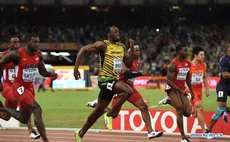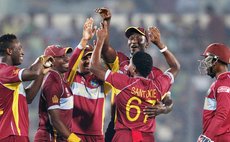Looking inside the head
A popular song of some years back has the singer voicing: "I want to look inside your head …" I feel that was the position of Clive Hubert Lloyd on his interacting with the players of the West Indies team while they were about to jump off the cliff to truncate the recent tour of India. Lloyd said he reasoned with the players they should think long and deep and refrain from doing the unthinkable. All this was argued on the great strength that the young mavericks had everything to lose and nothing to gain by taking what has turned out to be an extremely reckless decision – the most sanctimoniously asinine ever to pervert the long history of Caribbean cricket. Lloyd had three meetings with the players, two of which he received invitation.
Lloyd made his Test debut for West Indies in 1966 versus India at Bombay. His first Test century came in his 4th Test, 118 against England in 1968 at Trinidad. His early Test career was under the captaincy of Sir Gary Sobers and then under that of Rohan Kanhai, two men he had reason to revere for the manner they contributed to the team as batsmen. Leading always from the front, Sobers averaged 114.00, 90.83, 48.70 and 76.00 and scored eight centuries in successive series between 1966 and 1973.
Kanhai in a shorter tenure at the helm scored three centuries while always featuring at or near the top of the averages. With such immense pedigree preceding him, and West Indies enjoying heritage of strong ascendancy on the international scene, Lloyd proceeded to solve all challenges standing in the way of surmounting the pinnacle of the world stage! Under him West Indies acceded to fullest recognition as champions of world cricket and won outright the first two World Cups.
If credentials as lofty as this were not sufficient to persuade the players to turn an attentive ear to the voice of cogent reason, it is evident that a horrible degree of denseness on their part remains strongly in need of purgatorial treatment.
Immediate sense of affront, not to himself but to a concession towards vital reasonableness, must have impelled Lloyd to think the current players to be irretrievably void of good thinking. My late friend Ashley Roberts once told me nobody born after the year 1947 was any good! And that included his own children. It is difficult for Lloyd to be as candid despite his personal feelings about the appalling evidence he encountered as to the lengths the modern day West Indies cricketers can go towards self annihilation.
There seems little to doubt that Lloyd's inner feelings lean towards dismissing the players as a bad lot requiring us to start from scratch with individuals less tainted with bombastic notions of self worth which are by no means justified by the trend of their performances on the field of play. Remember, we are as low as eighth in the international ratings! And that is eight out of ten!
Regrettably, the hands of all concerned may feel tied by the enormity of the financial debt owed to India and the irony that the same players – culpable as they are – have to be resorted to in the hope of more than thirty million dollars (US) being made good over an oppressive time span. This is so since other countries are apt to apply an insistence that the "best players" be fielded in a representative West Indies side chosen for bilateral engagements with them.
This is unfortunate as the offending players should be abolished and a cogent attempt made to evolve contractual relations of pay being equated with acceptable levels of performance by a new breed of players. I have wrestled with notions of a plausible scheme to be inserted in the body of a player's contract with the board. This is despite the awkwardness of producing benchmarks typifying particular figures as suitable indices for performance ratings.
We can look to the three basic departments of the game and apportion performance scores. However, before getting down to this it should be useful that certain guidelines may be included in the exercise. Pertinent here is the assertion by Sir Frank Worrel that any side equipped with six excellent stroke players is expected to be favoured with the success of at least two of them in any one innings.
One thing Worrell did not say, but which should obviously be implied, is the component of consistency within the aspect of excellence. Question to be asked is: do we have players' answering to Sir Frank's categorization of excellence. The practical response to this is in the negative. We may need to cut our suit to meet the cloth at our disposal. In this regard we may be better off fashioning basic batting material along the lines of Chanderpaul. Please don't be alarmed. Success in batting – our weakest department – is forcing bowlers to bowl on your preferred terms. As to the time factor this is only aesthetic. We have lost Test matches in four days and in three days, meaning we don't spend enough time while batting. This represents all the difference between winning and drawing as against losing in our five day engagements.
Importantly, the current players are layered with the macho notion that they are not West Indian if they don't stay up late unto the 5 am zone when they attend social functions. That is quite unlike other international teams who are winning against us! To conform to this extreme, perhaps inadvertently enshrined in Sir Gary Sobers' auto-biography in which he defined himself as not an early sleeper, it is to assume that all of our players qualify to fit into the shoes of the great man with bat, ball or fielding.
Discipline aligned to the orthodox has to be instated because West Indies have great difficulty doing well from session to session or from one day to another or from one innings to the next, then also from one match to the succeeding match. Hence, there is a fitness deficit, of which Sobers or Worrel could not have been accused of having. And certainly their attention spans were not deficient.
Lloyd will have to look deep inside the heads of our unruly characters and convince them that some are born great but most only achieve greatness. It is one thing to be actually great and merely to assume you are what you are not. A Prince component in our exercise is the very real fact that cricket tours are no longer four or five month affairs. Players are now to adapt to arriving for a tour in top condition and match form without any time for preliminary tune-ups. This is inevitable in the realm of big money as the reward for top performance on demand from lucrative television entities.
To arrive at a suitable means of quantifying performance within the West Indies team we may use a figure, somewhat arbitrarily, like IC or 20 to mark individual efforts, the rational given in advance so players would be aware before hand as to agreeable expectations. In a subsequent issue I propose to go into details – not expected to please everyone, but hopefully a starting point rather than none at all. How well the West Indies board itself configures appropriately is another matter. The board ought definitely to set the example and take the lead by keeping its administrative performance at impeccable height. The topical slogan "CHANGE IS A MUST AND NOT AN OPTION" is to be applied radically!




